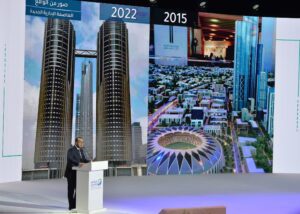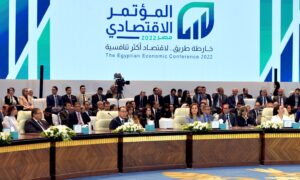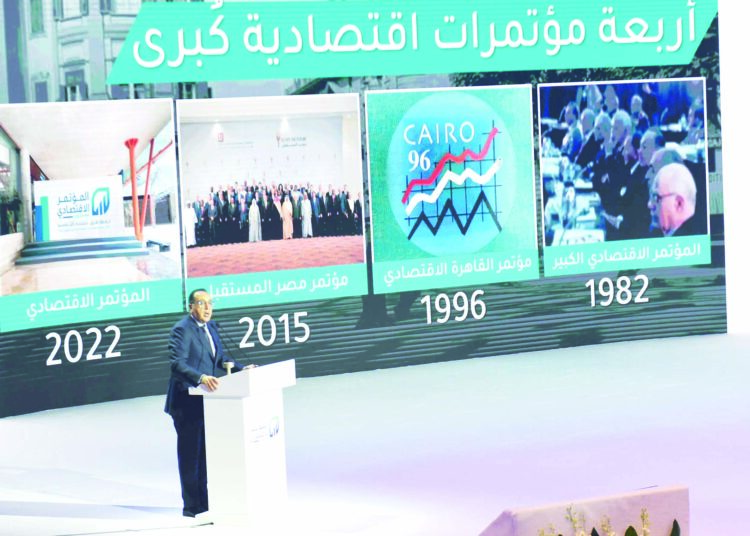Egypt’s Prime Minister Moutsfa Madbouli said on Sunday that the current global economic crisis has been unprecedented in scale and effects, especially on developing countries like Egypt.
He added at the inaugural session of the ‘Economic Conference … Egypt 2022’, which is bringing together the nation’s top economy specialists and experts and government officials to discuss the way ahead for the national economy, that this economic crisis has not been witnessed since World War II.
“Developed countries, which are economically powerful, as well as emerging countries, struggl to survive and ensure their stability,” the prime minister said.
“Egypt is not immune from these circumstances, having been classified by all international institutions as one of the countries hardest hit by this major global crisis,” he added.
The economic conference was suggested by President Abdel Fattah El Sisi almost a month and a half ago.
It comes as the war in Ukraine leaves its toll on the Egyptian economy as it does on the economies of other countries around the world.
It will last until Tuesday, with a large number of sessions, seminars, roundtable discussions and workshops included in its agenda.
Addressing those attending the inaugural session of the conference, which was titled ‘Egyptian economic in 40 years … What’s next?’, the prime minister said the government has been closely monitoring reports written about Egypt everywhere, including comments made on social media.
We did this, he said, in our bid to identify the opinions of Egyptians and listen to the views of experts.
He added that some of the opinions expressed turned out not to be based on accurate knowledge of the reality and conditions of the Egyptian economy, or on real figures that reflect the reality of this economy.
This was why the prime minister was keen to present an extrapolation of the situation of the national economy in the past 40 years.
Right start
The prime minister said that knowing economic conditions in those years is necessary before embarking on the formulation of a roadmap for the future.
“We need to build solutions for the future based on a real database,” the prime minister said.
The current economic conference is the fourth to be organized in Egypt in four decades to discuss the country’s economic problems and find solutions to them.

One of such conferences was held in 1982, while the other was organized in 2015.
Prime Minister Madbouli said these two conferences were especially important because both were held while Egypt was in the midst of very exceptional circumstances.
In 1982, he said, Egypt was still reeling from the effects of the war for the 1973 war for the liberation of Sinai from Israeli occupation.
The economy, the prime minister said, suffered enormous burdens and problems at that time.
These burdens, he added, prompted the Egyptian leadership then to take a series of economic decisions, including the economic open-door policy.
He noted that prevalent political crises at the time ended in the assassination of president Sadat in 1981.
The prime minister said the 2015 economic conference was held while Egypt experienced a violent political crisis, including an unprecedented wave of terrorist attacks.
He noted that President Sisi called for holding the conference so that the government and specialists would discuss the conditions of the Egyptian economy and means of pushing it forward.
Bleak conditions
The prime minister then went through some of the headlines of local newspapers about the conditions of the national economy.
These headlines, he said, reflected the crises facing different sectors of the Egyptian economy, especially the service sector in the period between 1978 and 1981.
The newspaper articles and photos reviewed by the prime minister included some of the local public transport system, the hospitals, schools, and public utilities.
Some of the photos were also of long queues of people standing outside bakeries and butane gas cylinder distribution outlets.
The prime minister noted that almost 60% of Egypt’s population is under the age of 40.
“Therefore, many of the crises experienced by the Egyptian people in 1982 were not experienced by almost 60 per cent of the members of the public living today,” the prime minister said.
He added that the late president Mubarak held the 1982 conference and invited to it 40 economists.
These economists, he said, tried to draw up a plan for solving the problems of the national economy.
He added that those participating in the conference identified ten main challenges facing Egypt at the time, including the population explosion.
Egypt’s population in 1982 was 44 million. Nonetheless, the population became 104 million almost 40 years later.
Prime Minister Madbouli noted that Egypt needed to construct 8.5 million flats over 20 years to accommodate the growth in the population and demand for housing.

This meant, he said, that Egypt should have built nearly 500,000 million flats every year for 20 years to overcome this worsening housing problem.
The construction of such an enormous number of flats, he added, would also have helped Egypt avoid the creation of slums in in its different governorates.
Subsidies, debts, budget
The prime minister then moved to fuel and food subsidies as a file.
He said economists participating in the 1982 economic conference called for freedom in dealing with foreign currencies.
He added that Egypt suffered a severe budget deficit at the time, one that made it necessary for state authorities to initiate strict financial reforms.
The ratio of external debt to GDP at this time exceeded 100 per cent, the prime minister said.
He added that the growth in Egypt’s population has never been matched with an equal growth in economic resources.
The growth in Egypt’s population over the years has been far larger, sometimes than the growth in the whole of Europe, the prime minister said.
He added that the economic circumstances of the 1980s continued to have their toll on the national economy until 2011.
This is particularly true, he said, when it comes to prevalent sewage service problems.
Prime Minister Madbouli noted that only 45 per cent of urban areas had sewage, whereas only 12 per cent of the countryside was had sewage.
There were also traffic congestion, power outages, butane gas cylinders shortages, and a lack of bread and fuel for the members of the public.
The prime minister then moved to the investments poured in the industrial sector over the years.
The real problem was that, he said,only 6 billion Egyptian pounds were allocated in investments for this sector over the years until 2011.
“Nevertheless, a change in industrial investments happened a few years ago when the private sector began to participate in some industrial projects,” Prime Minister Madbouli said.
He added that economists participating in the 1982 conference pointed to the lack of enough attention for public housing.
This was why, he said, the government launched programmes for national housing.
“Nevertheless, the volume of housing produced remained insufficient to meet needs, which led to the continuation of the problem of unsafe and unplanned areas,” he added.
Slums everywhere
He noted that in some cities, unplanned housing represented between 50 and 60 per cent of all housing.
The prime minister referred to the persistence of the problem of encroachments on farmland, which caused the loss of tens of thousands of acres.
He said national agricultural production in the 1980s was far from sufficient to meet the needs of the members of the public.
Egypt, he said, needed to reclaim 150,000 acres of land every year at least to produce enough food for its people.
He noted that the government could only reclaim 77,000 acres of land every year.
The prime minister then moved to public debts in the past 30 years, specifically from 1981 to 2011.
He pointed out that in this period despite all efforts to solve the problems of the state, Egypt’s circumstances forced it to adopt compromise solutions to deal with problems in the short term.
Those solutions, he said, were characterized by low investment spending and a focus on consumer spending.
“The proportion of the budget went to the salaries of civil servants and the pensions of retirees,” the prime minister.
He added that the investment spending driving the country’s growth had been low.
Adding insult to injury, the prime minister said, was that the national industrial production capacity was weak and the economy was incapable of creating enough jobs.
He described solutions adopted by previous governments to fix the economy in the past as mere ‘painkillers’.
The prime minister noted that society did not favour many of the proposed solutions to economic problems at the time.
He cited the example of the 1971 violence that erupted after president Sadat slashed bread subsidies by a few piasters.
Egypt, he said, had never taken radical solutions in the face of its problems.
“This caused problems to get worse and keep piling up,” the prime minister said.
Need for radical solutions
He added that radical solutions are not usually popular and usually entail political risks that are difficult for most governments to bear.
Therefore, he said, most previous governments preferred to maintain the stability of the state to solving the problems of the economy.
“Sorry to say, this approach will not make our country the developed one we dream of,” the prime minister said.
He touched upon the 2011 and 2013 revolutions and their negative impacts on the national economy.
The prime minister also cited statements by the World Bank and the International Monetary Fund (IMF) about Egypt.
In 2015, he said, the IMF said Egypt had gone through a period of radical change and that the serious events that occurred in January 2011 heralded a period of great hopes, but also great challenges.
He quoted the international crediting agency as noting that since 2011 Egypt had suffered for a number of years from low growth and high unemployment, and that these problems have been exacerbated by the large fiscal deficit, growing public debt and external fragility.
The prime minister estimated Egypt’s losses as a result of political instability and terrorism in the period since 2011 at $477 billion.
The losses of the tourism sector, he said, reached 32 per cent.
He added that unemployment reached 13 per cent of the workforce and that Egypt’s GDP growth declined to 2.2 per cent.
“There happened a significant decline in economic indicators as a result of the circumstances experienced by Egypt in this period,” Prime Minister Madbouli said.
He noted that between February 2011 and May 2013, Egypt’s its credit rating fell 6 times.
In general, he said, we faced a catastrophic economic situation that resulted in a sharp decline in the growth rate to 3%, in addition to the highest budget deficit in 30 years (13 per cent).
“The continuation of these conditions would inevitably have led to more dangerous conditions for the Egyptian state as a whole,” the prime minister said.
“This made it necessary for the state to act and it has started taking this action since 2015,” he added.






Discussion about this post